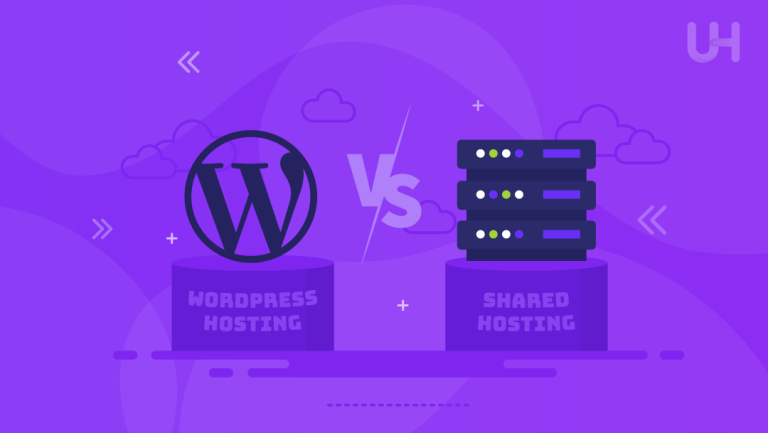Shared hosting is a popular and affordable solution for individuals and businesses looking to establish an online presence. However, before deciding, it is essential to know what is shared hosting, weigh the pros and cons, and determine if it aligns with your specific needs and goals.
By understanding the crucial factors and considerations, you could make an informed decision about whether shared web hosting plans are the right choice for you. By exploring both the advantages and disadvantages of shared hosting, you will gain a comprehensive understanding of that solution, enabling you to evaluate its suitability for your website.
A shared hosting service is a single server that powers multiple sites. Each user receives a specific portion of resources for their website. It is a cost-effective solution since it divides maintenance and resources among users.
It is especially beneficial for individuals and small businesses with limited technical knowledge because it offers convenience through user-friendly control panels that facilitate website management, application installation, and email configuration. Server updates and security measures are handled by the web hosting company, relieving users of technical burdens.
However, shared web hosting does have limitations. The performance can be affected by the activities of other websites on the web server. If one website experiences high traffic or consumes significant resources, it may impact the performance of other websites. Moreover, users have limited control over server settings and customization options.
Despite these limitations, this solution remains a practical choice for many websites due to its affordability and user-friendly features. It is especially well-suited for smaller websites with lower traffic and resource needs. As websites expand and demand greater control, scalability, and performance, you can consider alternative options.

They are three major types of web hosting, each with its resource allocation, control, and cost. Here, we outline the crucial differences between them.
On a shared server users use the same resources like CPU, disk space, and bandwidth. It is the most cost-effective option but with a limited level of control and server performance. It is typically suitable for small websites with low traffic and resource demands.
VPS hosting creates a virtual environment within a physical server. It emulates a machine by partitioning the server’s resources into virtual machines. Each VPS operates independently, with its dedicated resources including CPU, memory, and disk space. Without problems, you can host more than one website.
Users have greater control and flexibility over their environment, allowing for custom software and operating system installations, root access for multiple users, and server configuration. VPS hosting is well-suited for websites that require more control, higher performance, and scalability. It is the best solution for small and medium businesses and projects with moderate resource requirements.
Dedicated servers are physical servers dedicated to a single user or organization. This exclusive allocation of all resources grants users maximum control, customization, security features, processing power, and performance. Dedicated web hosting is ideal for large websites, sophisticated e-commerce platforms, or applications with high traffic, resource-intensive requirements, and a need for enhanced security.
However, dedicated hosting services are more expensive and demand advanced technical knowledge for server maintenance and management.
Shared hosting services provide numerous advantages. Their affordability makes them a cost-effective solution for individuals and small businesses with limited budgets.
One of the notable benefits is the convenience it offers. The hosting companies handle server setup and maintenance tasks, sparing users the need for technical expertise. It simplifies the process of website setup and management. Additionally, shared hosting plans come with reliable technical support, ensuring that users receive assistance whenever needed.
The shared hosting plan also allows for scalability. Hosting providers offer various plans, enabling users to upgrade their hosting package as their website grows and demands more resources. Putting multiple sites on a single hosting server facilitates efficient resource sharing and maximizes cost-effectiveness.
Despite its advantages, it has limitations. In a shared hosting environment, resources such as CPU, RAM, and storage space power various websites. This resource sharing can lead to limited availability and potentially impact the performance of your website.
Given that multiple websites share a single server, your website performance can suffer because of the excessive resource usage of other websites. It can result in slower loading times and a diminished user experience.
A shared server also presents higher security risks compared to other solutions. If one website on the shared server is compromised, there is a possibility that websites sharing the same server could be affected as well. It is crucial to implement proper security measures to mitigate these risks.
Additionally, shared hosting restricts your control over server configurations and software installations. You are limited to the predefined settings and options provided by the hosting provider, which may not meet your specific needs or allow for extensive customization.
Now that we have thoroughly examined the advantages and disadvantages of that web hosting service, it’s time to determine if it is the optimal solution for your needs.
- Small Businesses and Personal Websites: It proves to be an excellent option for small businesses and individuals in the early stages of their website development. It offers an affordable hosting solution with sufficient resources to support basic web pages and blogs.
- Startups and Low-Traffic Websites: If you are running a startup or have a website with low to moderate traffic, shared hosting can cater to your needs without straining your budget. It provides a cost-effective approach to launching your online presence and gradually expanding your website.
- Budget Constraints: It is often the most budget-friendly alternative compared to virtual and dedicated hosting. If you have limited financial resources or prefer to allocate your budget to other aspects of your business, shared servers are a suitable choice for you.
- Non-Technical Users: Shared hosting is user-friendly, making it an ideal option for individuals with limited technical knowledge. Web hosting companies typically offer intuitive control panels and AI website builder options, streamlining the process of managing and maintaining your website.
- Future Growth Considerations: If you anticipate substantial growth or foresee an increase in your website’s resource requirements over time, shared servers may have their limitations. Assess your long-term goals and consider whether the scalability and resources will accommodate your future needs.
Evaluate your specific requirements and align them with the advantages and limitations of a web hosting solution. Make an informed decision that best suits your online endeavors.
When searching for the best-shared hosting providers and best-shared hosting plan, consider your specific needs and goals. It is not a one-size-fits-all solution, so taking the time to make an informed decision is crucial.
- Analyze Your Unique Circumstances: Understand your website’s requirements, including expected traffic, storage needs, and resource demands. Consider your long-term goals and scalability requirements.
- Research Reputable Shared Hosting Providers: Look for web hosting companies with a solid reputation, positive customer reviews, and reliable service. Consider factors such as uptime guarantees, server performance, and customer support availability.
- Evaluate Shared Hosting Plans: Compare the features, resources, pricing, and advantages of shared hosting plans offered by the providers you are considering. Pay attention to allocated disk space, bandwidth, email accounts, and any limitations imposed.
- Assess Customer Support: Check the level of customer support provided by the hosting company. Look for responsive and knowledgeable support teams that can assist you in case of any issues or concerns.
- Consider Additional Features: Some providers may offer extras like website builders, one-click application installations, or free domain registration. Assess whether these additional features align with your needs.
- Read and Understand the Terms and Conditions: Thoroughly review the terms and conditions of the hosting plan, paying attention to any limitations, restrictions, or hidden costs.
Find the Best Hosting Provider
UltaHost is a reputable web host with a variety of hosting plans to suit different needs. Get a reliable web hosting solution at a budget-friendly price. Furthermore, by paying a year in advance, you will get a free domain.
UltaHost offers a user-friendly control panel, making it easy to manage your website, email accounts, and other features. You can effortlessly navigate and customize everything without technical expertise.

All hosting plans at UltaHost come with unlimited bandwidth. You can accommodate high-traffic volumes and have ample storage space for your website’s files and data.
UltaHost, like other reputable web hosting companies, ensures reliable server performance and provides support. Their team is available to assist you with any issues or inquiries. It’s an ideal option for individuals and small businesses who value affordability, reliability, and ease of use. And when your website will grow, you can scale your plan to VPS hosting without problems.
Conclusion
Shared hosting provides an affordable and user-friendly solution for individuals and small businesses with budget constraints. It offers easy setup, maintenance, and a reliable hosting environment. However, it is essential to consider the limitations, including resource constraints, potential performance issues, security risks, and limited control.
To make the best decision, assess your needs, consider alternative hosting solutions if required, and choose a reputable provider with a proven track record. By weighing the pros and cons, you can find the shared hosting plan that aligns with your goals, ensuring a successful online presence for your website.
Are you concerned about security issues? With Secure WordPress Hosting, you get the benefits of a user-friendly control panel, ample storage space, and the ability to host your WordPress websites. Enjoy the reliability and performance specifically optimized for WordPress. Get 24/7 support from our team to ensure a smooth experience. Let us show you the difference! Check out our plans!










